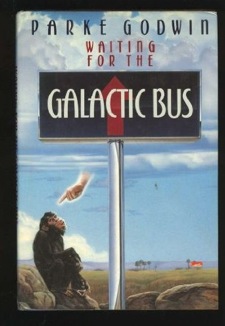Parke Godwin’s Waiting for the Galactic Bus is one of the candidates for weirdest book in the world. Some adolescent energy beings are off for a post-graduation tour of the universe and two brothers, Barion and Coyul, get briefly stranded on Earth for a few million years. They meddle with an ape and before they know where they are they’re running heaven (“topside”) and hell (“below stairs”) with the help of the actor John Wilkes Booth (“I killed one Republican!”) and St. Augustine. These are gods that are anything but omniscient—indeed they’re incompetent and slapdash, but they get the job done as best they can.
Godwin has always been a superb stylist, and Waiting for the Galactic Bus reads almost like poetry.
So much for motivations. Barion wanted to win a science prize, Coyul only wanted to go home and write music, but the thing was done. A great deal of bloodshed, art, and religion, would be perpetuated in both their names, and neither would be understood at all. As they had done to him, the human modified them to a lesser and more flattering truth that he could live with. Dazed, intermittently sobbing and laughing like a squeaky hinge, the creature deserted the waterhold and scampered away to history, and other mixed blessings.
Waiting for the Galactic Bus could also potentially have the Riverworld problem—you have access to everybody who was ever alive, so what do you do with them? Fortunately, Godwin has a good idea of what to do, which is to stage the redemption of Charity Stovall, a poor white American girl who has fallen in with racists and fundamentalists and who needs to learn to know herself—which means literally taking her through Hell.
Her boyfriend, Roy, is a tinpot Hitler, and Barion and Coyul are desperately trying to avoid another episode like that. The story of Charity’s redemption and self-discovery takes place against the background of Below Stairs, some of it real (Judas Iscariot driving a taxi) and some of it staged for her benefit by the actors. The bit parts can be anybody and often are, and the actors bickering among themselves about reviews and billing are hilarious.
This is not a book that even nods to realism. Indeed, it’s a book that I doubt realism would recognise if it passed it by in the street. It’s not sure it even belongs in the same dictionary. On a realism scale it makes The Hitchhiker’s Guide to the Galaxy seem like Halting State.
But there are other virtues, and it has those—it’s charming and funny and genuinely original, it fits together like a sliding block puzzle and it’s light and dark at the same time. The lightness casts the shadow that is the darkness. There isn’t much that does this, there isn’t much that even tries.
I liked the sequel, The Snake Oil Wars, much less. It didn’t seem like a trick it would be possible to pull off twice.
If you like books that are beautifully written, and funny, and not like anything else, and if you don’t mind blasphemy, you might really enjoy this.
Jo Walton is a science fiction and fantasy writer. She’s published eight novels, most recently Half a Crown and Lifelode, and two poetry collections. She reads a lot, and blogs about it here regularly. She comes from Wales but lives in Montreal where the food and books are more varied.










